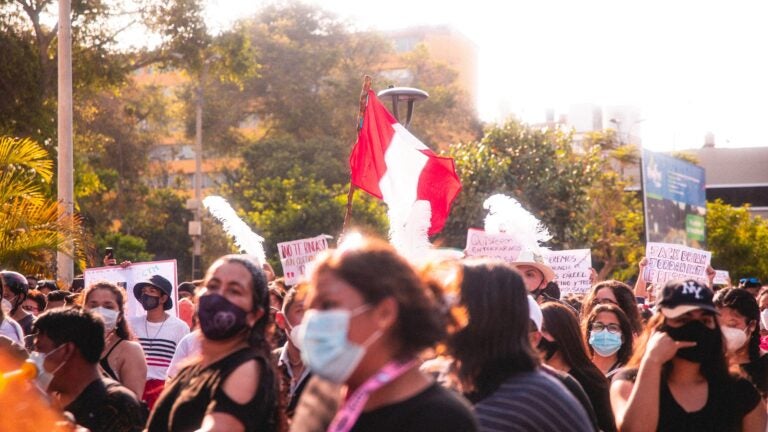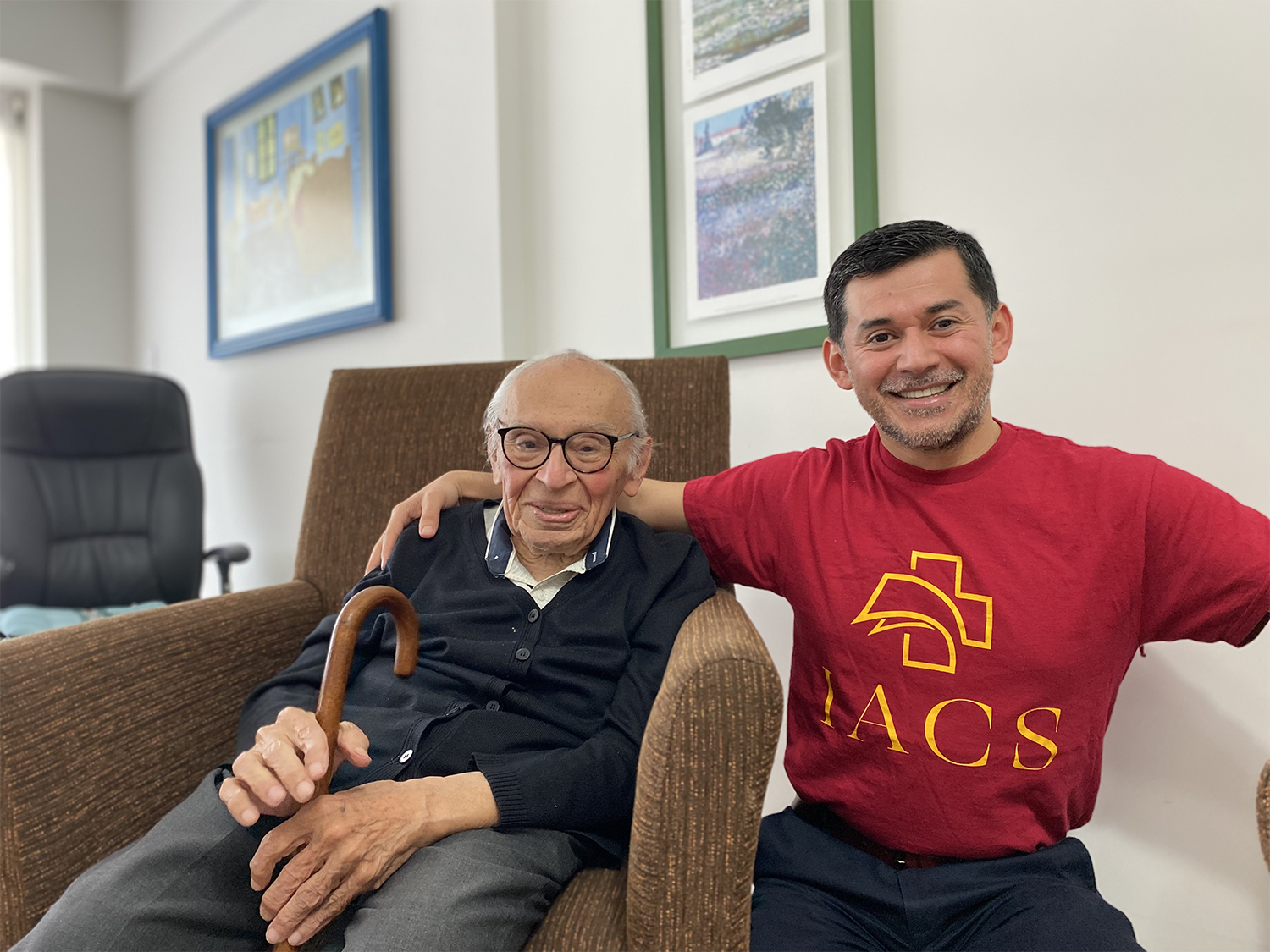
Peru protest
Solidarity and Hope in Peru
“Our days bear the mark of the new presence of those who in fact were ‘absent’ in our society and in the church. ‘Absent’ means of little or no significance, and even more, without the possibility of expressing their own sufferings, their solidarity, their projects, their hopes.”
— Gustavo Gutiérrez, A Theology of Liberation (1988)
Peruvian theologian Gustavo Gutiérrez has repeatedly called the irruption of the poor a new presence, a far-reaching historical event and one which continues to mark the life of the Latin American church. Lest we sanitize the event, an eruption suggests actions that burst and break in, perhaps not unlike the ways that Christian communities speak of the breaking in of the presence of God in history — unannounced, unexpected, and for many, unwelcome. Irruptions have a way of unsettling the way things are and of reconfiguring life.
The irruption of the poor to which Gutiérrez refers is that long and unfinished history of communities whose significance barely registers — if at all — on the ledger of humanity, but who with a stubborn desire for life resist economies, policies and a social world that was not created for them, but fundamentally against them. As I watch the news of what continues to transpire in Peru, I keep thinking of the irruption of the poor, and of the ongoing challenge that it presents for Christian thought and action.
I am in Peru with the support of the DePaul Fellowship from the Institute of Advanced Catholic Studies at USC to edit an unfinished manuscript of Gutiérrez, my former professor and mentor whom I visit every year. Throughout my visits I have watched the country move from one president to another, for a total of six presidents in the past five years. On this visit the intensity of the events marking the country have reached the capital of Lima, and partly because of that, they have reached the world.

Since early December 2022, communities across the country, but especially Quechua and Aymara communities, have expressed their grievances with protests against a government that they say does not represent them and their concerns. I reached out to an Aymara colleague in the Andean region of Puno in the south of the country where some of the protests began to ask about how she was doing, and she pithily summarized the heart of the conflict: “Las comunidades estamos invisible” [our communities are invisible]
Then she added: “El cambio climático también nos golpea muy fuerte, la helada se llevó todo nuestro siembro” [Climate change is also hitting us very hard, the frost has taken all our crops]
The social, economic and political invisibility compounds the impacts of climate change on indigenous communities, whose livelihood is disappearing.
Las comunidades estamos invisible
The protests that began in the peripheries of the country expanded to the capital of Lima on January 19, bringing to the political center pressure for new national elections. Government forces have killed close to fifty protesters since December 2022, a number that suggests that some police and military officers shoot to kill in these confrontations. While protests continue on the streets of the capital, the police have also targeted the National University of San Marcos, the oldest in the Americas founded in the mid-1500s, in what is a clear attempt to instill fear in university students who may want to support protesters.
Religious leaders in Lima have organized at least two major vigils to commemorate the deaths, to denounce the violence, and to forge connections among people of faith who are attempting to respond to the present reality. Discussions are taking place among church leaders to discern how faith communities can respond in practical ways. For example, some faith communities are opening their worship spaces as shelters for those who have come from far away, though this is not done publicly. If the protests continue for weeks, will more religious congregations and diocesan churches open parishes so that those who have traveled from the peripheries of the country can take refuge at night? And are these communities willing to face the political consequences for doing so?
Vigils have been held in Lima, Peru to denounce violence and commemorate those killed while protesting the government. Video courtesy of Leo Guardado.
These discussions remind me of Archbishop Oscar Romero’s response in a similar situation in January of 1980 when thousands of campesinos from rural villages who had traveled to the capital to protest government repression turned to the church for practical support. Some church leaders felt that providing assistance could be misinterpreted because of the prejudice against popular grassroot organizations, but Romero asserted that “in such cases what must prevail is human need and Christian charity,” (Oscar Romero, Diary, January 24, 1980). In fact, the need to find temporary shelter for thousands of persons in January 1980 led Romero to organize the Archdiocesan Emergency Committee in February 1980, a committee whose task it would be to address the needs generated by the political repression. From that point on, Romero spoke of the need for the church to live always in a state of emergency (February 17, 1980 Homily in Spanish; English translation).
The irruption of the poor continues to reconfigure the church locally and globally, for this is the greatest challenge to Christian faith in modernity. The events currently unfolding in Peru are an echo to so much that has already been lived in this country, and in my home country of El Salvador, and throughout Latin America and the Caribbean. As I read Gutiérrez’ unfinished monograph, where he reflects on the poor and the church in the past half century and the lives that have been lost, and as I participate in vigils for the dead held here in Lima, I am reminded of that truth of Christian faith: God is here, breaking in with every act of solidarity, of hope, of refuge, of active nonviolent resistance, of lament, of healing, and of forgiveness for what has been done and for what has been left undone.
Fundamentally, the healing of the country’s social wounds will require a deeper recognition of, and understanding from, the perspective of those communities who have been forced to exist — in society and in the church — as insignificant.”
Every day that passes brings the same question in Peru: How will this impasse be resolved?
Politically, many answers may be possible. But fundamentally, the healing of the country’s social wounds will require a deeper recognition of, and understanding from, the perspective of those communities who have been forced to exist — in society and in the church — as insignificant. One thing is clear, the church cannot be absent from the crisis despite possible misunderstandings, for God is already present in the struggle for life.
Editor’s note: Leo Guardado, Ph.D., is an assistant professor in the Department of Theology at Fordham University and the inaugural DePaul Fellow at the Institute for Advanced Catholic Studies at USC.